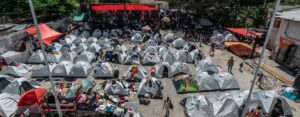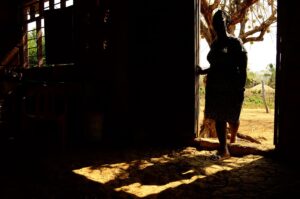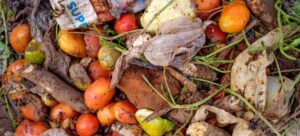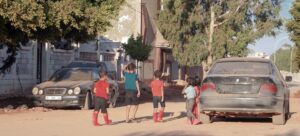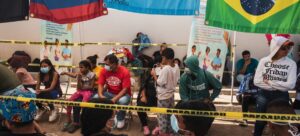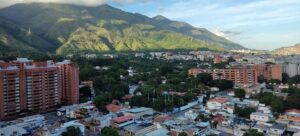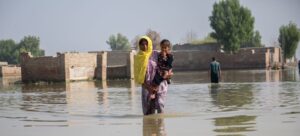The Haitian Prime Minister Ariel Henry reiterated his call for an international force in his speech to the UN General Assembly on Friday 22 September.
“In the name of the women and girls raped every day, the thousands of families driven from their homes, the children and young people of Haiti, who have been denied the right to education and instruction, in the name of all a people who are victims of the barbarity of gangs, I urge the international community to act quickly.”
Here’s what you need to know about what happens next:

Why is an international security mission necessary?
Haiti is wracked by violence that has escalated to unprecedented levels. Between 1 January and 9 September this year, 3,000 homicides were reported; there were also over 1,500 victims of kidnapping for ransom. The UN says that some 200,000 people (half of whom are children) have been forced to flee their homes because it’s just too dangerous to remain.
Sexual violence and abuse against women and girls is on the rise, and tens of thousands of children are unable to attend school due to insecurity.
Haiti’s military is small and only modestly equipped. The Haitian National Police (HNP) is unable to fully contain the outbreak of violence and needs international support so that Haitians can return to a situation where they can go about their daily lives without the fear of being murdered, displaced, kidnapped, or raped.

Who is supporting the security assistance?
Just about everyone agrees that assistance from the international community is needed to support the HNP in its efforts to stabilize the situation. As far back as October 2022 UN Secretary-General António Guterres responded to a request from Prime Minister Henry, urging nations to step forward.
In July, on a visit to the Haitian capital, Port-au-Prince, the UN chief repeated that immediate action was necessary.
“The seriousness of the situation demands our urgent and sustained attention. We must put the victims and the civilian population at the centre of our concerns and priorities” adding that “if we do not act now, instability and violence will have a lasting impact on generations of Haitians. I reiterate my call to all partners to increase their support for the national police – in the form of financing, training or equipment.”
The issue was once again high on the agenda of the general debate of the UN General Assembly’s 78th session, which concluded on Tuesday.
In his speech, US President Joe Biden said the “people of Haiti cannot wait much longer,” and Luis Rodolfo Abinader Corona, the President of the Dominican Republic, which shares the island of Hispaniola with Haiti, called for “a revival of our collective determination to forge a more secure, inclusive and sustainable future for Haiti”.

Why has it taken so long to establish the mission?
A major sticking point has always been which country would step forward to lead what could be a very complicated and risky mission. Media reports suggest that gangs exert some control over around 80 per cent of the capital and the Haitian Prime Minister said that there were 162 armed groups with 3,000 “soldiers” across the country.
In late July, Kenya announced it was considering leading the multinational security support effort in Haiti. Kenyan officials have visited Haiti and held talks with Haitian and regional leaders, among others, regarding the mandate and scope of such an operation.
Kenyan President William Ruto told the General Assembly that Haitians were “suffering immensely from the bitter legacy of slavery, colonialism, sabotage and neglect”, adding that dealing with the situation there was the “ultimate test of international solidarity and collective action”.
Fellow Caribbean nations and members of the CARICOM regional group, including Jamaica, the Bahamas and Antigua and Barbuda have expressed their readiness to support the mission.

What type of operation will it be?
It’s important to note that the security mission will not be a UN operation, unlike MINUSTAH, the UN peacekeeping mission to Haiti, which ended in 2017.
Prime Minister Henry has asked for the “robust support” of police and military personnel to support the HNP. He added that this support was “indispensable to defeat the gangs, re-establish order and create an environment for the proper functioning of the State”.
President Ruto of Kenya said the mission, which could include 1,000 Kenyan personnel, would be “well-resourced and effective”.

What happens next and what is the UN’s involvement?
The UN Security Council is due to meet to develop the framework for and authorize this non-UN mission. The 15-members of the Council will consider approving what is known as a Chapter Seven provision of the UN Charter that authorizes the use of force after all other measures to maintain international peace and security are exhausted.
Meanwhile, the UN continues to support Haiti on multiple fronts. A political mission, known by its French acronym, BINUH, continues to support government efforts to strengthen political stability and good governance, including the rule of law.
UN agencies are also providing immediate humanitarian aid to Haitians affected by violence, insecurity and natural disasters such as the August 2021 earthquake. And they are supporting national authorities and public institutions in restoring long-term sustainable development gains. This includes strengthening an inclusive economy and the administration of justice, ensuring the delivery of and access to basic social services and improving the management of multidimensional risks.
